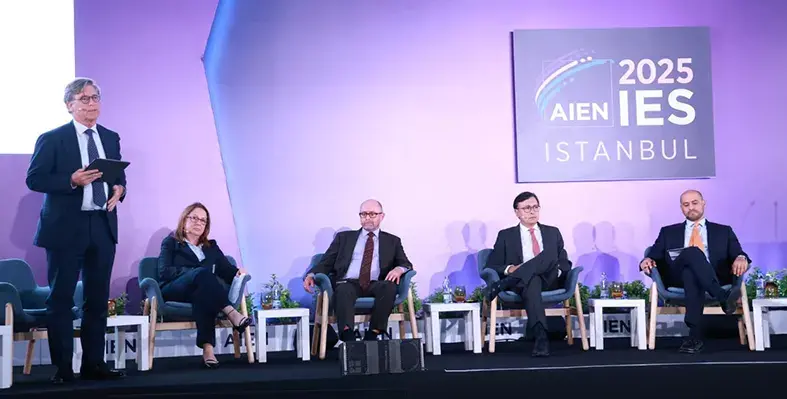At final session of the AIEN International Energy Summit, held in Istanbul from 10-12 June, the trilemma of energy security, affordability, and sustainability was in the spotlight
The panel also debated whether profitability should be considered the fourth leg of the trilemma.
Moderator Jay Park KC, managing partner, Park Energy Advisory Ltd asked the panel what the current priorities were of the triangle, and if we were seeing a shift to one corner.
Yelda Guven, VP Policy, EMEA, ExxonMobil Low Carbon Solutions said, “That’s the challenge – how do you make sure energy security and affordable energy can reach the growing population, but do it in a low carbon way? The industry knows how to reduce emissions but it needs support.”
Leonardo Sempertegui, general legal counsel, OPEC added, “While the perspective of security has been in everyone’s attention in recent years, it has been in the developing world for a long time. There is no way out of poverty without stable and abundant energy. At this point, thinking about reducing certain sources of energy with the objection of reaching an ‘artificial’ target – it is bringing some countries to a complicated position. What they need is development. So, this triangle has different legs in each jurisdiction.”
Carlos Bellorin, EVP Macro Research & Advisory, Welligence Energy Analytics agreed: ‘The corners of the triangle are always shifting. Security is currently a top priority to some countries due to ongoing turmoil around the world. Affordability affects everyone in the world. Sustainability hasn’t disappeared – we know a low carbon future is the way forward.’
Graham Kellas, SVP, Global Fiscal Research, Wood Mackenzie was asked how to balance sustainability in light of the growing demand for oil and gas. “10 years ago, the oil price had just crashed and there was the Paris agreement. We saw the level of total capital investment in energy supply rise in low carbon and renewables from one third to a half, while oil and gas came down. And then Covid happened and the momentum behind the sustainability bit of our triangle flipped to affordability. Then in the third phase, after February 2022 and the Russian invasion, it has turned to security. The level of investment into renewables has remained constant, but we have seen an uptick in oil and gas. Diversification is what is underplaying it, and we are not going to an end point with no fossil fuels being produced – there will always be a diverse range.”
At this point, a member of the audience asked if ‘profitability’ actually turned this into a ‘quadrilemma’.
“That’s spot on!’ said Kellas. “This is something that is sometimes lost in the conversation – the need for private companies to make a return for shareholders. There is a certain return you can make from risk-free bonds, so why would you invest in a new emerging project with all the risks attached? You can’t just tell companies that they must do “this or that” without acknowledging that shareholders need to see a return on their investment.”
Guven agreed. “This is what the public debate doesn’t cover enough! The private sector is beholden to shareholders. You have to have that return or no one will invest in the energy transition.”
Sempertegui slightly disagreed on the terminology. “I still think it is a trilemma. Profitability falls within sustainability, just not in terms of emissions. We have a system to sustain – we can’t just reverse 300-400 years of history. As long as we make policy based on facts and realities, we’re fine and going somewhere. When some actors think there is an ideology and have their own agenda, we are in a different scenario. So, I think it is a trilemma, but I appreciate these are semantics.”
Is profitability the fourth leg of the energy trilemma?

The energy trilemma was the focus of discussion at the session. (Image source: AIEN International Summit)







